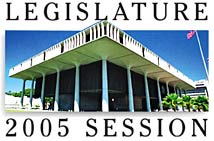Lingle opposes
youth-inmate limits
Gov. Linda Lingle told members of a Senate panel on Tuesday that the state should not be required to seek legislative approval before transferring juvenile inmates out of state.
|
|
She began by pointing out that the Legislature meets for only part of the year.
The Legislature is also not in the position to make good decisions about what is best for the state's youth prison, she said.
"While that I know that you all are well-meaning in wanting to have the decision-making authority on whether to send kids to the mainland or not if some sort of emergency develops ... I think that the record would show that the Office of Youth Services and the current management at (Hawaii Youth Correctional Facility) is in the very best position to make that kind of a decision," she said.
This fall, the governor's administration came under criticism when seven girls were transferred from the state's youth prison in Kailua to a lockup in Utah.
Office of Youth Services Director Sharon Agnew said the girls were sent away only as an emergency measure, to ease overcrowding among boys while renovations were being made to housing units at the Hawaii Youth Correctional Facility.
The office had not been able to notify all of the girls' families of the transfer before reports surfaced in the local media that the group was headed to Utah, she said.
Lingle visited the girls during their 50-day stay in Utah and read Tuesday from letters, handwritten on pieces of notebook paper, sent to her from some of the girls, who told about how positive the experience had been.
Proponents of the bill say it addresses concerns raised by the transfer, including underscoring the need to notify family members and that out-of-state transfer should only be a last resort.
And if the services that the girls received in Utah were as extraordinary as state officials have said, then all efforts should be made to match them in Hawaii, said Kat Brady, legislative coordinator for the Hawaii Juvenile Justice Project.
"I don't know how much they spent on the transfer, but I don't see why we can't buy services like that in the community programs that exist in Hawaii," Brady said.
Brady said she realizes that legislative approval would not be "doable" as the bill is currently written because Hawaii's Legislature is part time, meeting during the first four months of the year.
She instead suggested that the possibilities of transfers be presented to the Legislature as part of the annual budgeting process -- an idea Agnew rejected, noting that transfers are generally very rare.
Agnew said she also objected to the idea of taking public opinion about the placement of young inmates.
The committee deferred decision-making on the measure.
www.hawaii.gov/gov/
[News] [Business] [Features] [Sports] [Editorial] [Do It Electric!]
[Classified Ads] [Search] [Subscribe] [Info] [Letter to Editor]
[Feedback]

